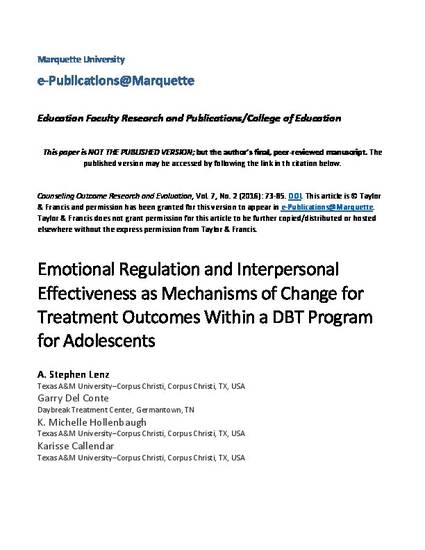
Article
Emotional Regulation and Interpersonal Effectiveness as Mechanisms of Change for Treatment Outcomes Within a DBT Program for Adolescents
Counseling Outcome Research and Evaluation
Document Type
Article
Language
eng
Publication Date
1-1-2016
Publisher
Taylor & Francis
Original Item ID
DOI: 10.1177/2150137816642439
Disciplines
Abstract
Predictive modeling was used to identify the degree that hypothesized moderators of dialectical behavioral therapy for adolescents (DBT-A) treatment outcomes predicted anxiety and depression symptoms over time. Participants were 66 adolescents (41 girls; 25 boys) with a mean age of 15.38 years (SD = 1.51) who completed a 7-week DBT-A intervention. Analyses revealed convergent models, wherein emotion regulation and interpersonal effectiveness were substantial predictors of change in the symptoms of anxiety, F(4, 65) = 23.21, p < .01, R2 = .60, and depression, F(4, 65) = 29.76, p < .01, R2 = .66.
Citation Information
A. Stephen Lenz, Garry Del Conte, K. Michelle Hollenbaugh and Karisse A. Callender. "Emotional Regulation and Interpersonal Effectiveness as Mechanisms of Change for Treatment Outcomes Within a DBT Program for Adolescents" Counseling Outcome Research and Evaluation (2016) ISSN: 2150-1378 Available at: http://works.bepress.com/karisse-callender/2/

Accepted version. Counseling Outcome Research and Evaluation, Vol. 7, No. 2 (2016): 73-85. DOI. © 2016 Taylor & Francis. Used with permission.
Karisse Callender was affiliated with Texas A&M University at the time of publication.